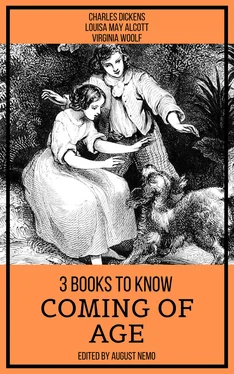The master refusing to entertain the subject until the journeyman was in a better temper, Orlick plunged at the furnace, drew out a red-hot bar, made at me with it as if he were going to run it through my body, whisked it round my head, laid it on the anvil, hammered it out—as if it were I, I thought, and the sparks were my spirting blood—and finally said, when he had hammered himself hot and the iron cold, and he again leaned on his hammer:
"Now, master!"
"Are you all right now?" demanded Joe.
"Ah! I am all right," said gruff Old Orlick.
"Then, as in general you stick to your work as well as most men," said Joe, "let it be a half-holiday for all."
My sister had been standing silent in the yard, within hearing—she was a most unscrupulous spy and listener—and she instantly looked in at one of the windows.
"Like you, you fool!" said she to Joe, "giving holidays to great idle hulkers like that. You are a rich man, upon my life, to waste wages in that way. I wish I was his master!"
"You'd be everybody's master, if you durst," retorted Orlick, with an ill-favoured grin.
("Let her alone," said Joe.)
"I'd be a match for all noodles and all rogues," returned my sister, beginning to work herself into a mighty rage. "And I couldn't be a match for the noodles, without being a match for your master, who's the dunder-headed king of the noodles. And I couldn't be a match for the rogues, without being a match for you, who are the blackest-looking and the worst rogue between this and France. Now!"
"You're a foul shrew, Mother Gargery," growled the journeyman. "If that makes a judge of rogues, you ought to be a good'un."
("Let her alone, will you?" said Joe.)
"What did you say?" cried my sister, beginning to scream. "What did you say? What did that fellow Orlick say to me, Pip? What did he call me, with my husband standing by? O! O! O!" Each of these exclamations was a shriek; and I must remark of my sister, what is equally true of all the violent women I have ever seen, that passion was no excuse for her, because it is undeniable that instead of lapsing into passion, she consciously and deliberately took extraordinary pains to force herself into it, and became blindly furious by regular stages; "what was the name he gave me before the base man who swore to defend me? O! Hold me! O!"
"Ah-h-h!" growled the journeyman, between his teeth, "I'd hold you, if you was my wife. I'd hold you under the pump, and choke it out of you."
("I tell you, let her alone," said Joe.)
"Oh! To hear him!" cried my sister, with a clap of her hands and a scream together—which was her next stage. "To hear the names he's giving me! That Orlick! In my own house! Me, a married woman! With my husband standing by! O! O!" Here my sister, after a fit of clappings and screamings, beat her hands upon her bosom and upon her knees, and threw her cap off, and pulled her hair down—which were the last stages on her road to frenzy. Being by this time a perfect Fury and a complete success, she made a dash at the door, which I had fortunately locked.
What could the wretched Joe do now, after his disregarded parenthetical interruptions, but stand up to his journeyman, and ask him what he meant by interfering betwixt himself and Mrs. Joe; and further whether he was man enough to come on? Old Orlick felt that the situation admitted of nothing less than coming on, and was on his defence straightway; so, without so much as pulling off their singed and burnt aprons, they went at one another, like two giants. But, if any man in that neighbourhood could stand up long against Joe, I never saw the man. Orlick, as if he had been of no more account than the pale young gentleman, was very soon among the coal-dust, and in no hurry to come out of it. Then, Joe unlocked the door and picked up my sister, who had dropped insensible at the window (but who had seen the fight first, I think), and who was carried into the house and laid down, and who was recommended to revive, and would do nothing but struggle and clench her hands in Joe's hair. Then, came that singular calm and silence which succeed all uproars; and then, with the vague sensation which I have always connected with such a lull—namely, that it was Sunday, and somebody was dead—I went up-stairs to dress myself.
When I came down again, I found Joe and Orlick sweeping up, without any other traces of discomposure than a slit in one of Orlick's nostrils, which was neither expressive nor ornamental. A pot of beer had appeared from the Jolly Bargemen, and they were sharing it by turns in a peaceable manner. The lull had a sedative and philosophical influence on Joe, who followed me out into the road to say, as a parting observation that might do me good, "On the Rampage, Pip, and off the Rampage, Pip—such is Life!"
With what absurd emotions (for, we think the feelings that are very serious in a man quite comical in a boy) I found myself again going to Miss Havisham's, matters little here. Nor, how I passed and repassed the gate many times before I could make up my mind to ring. Nor, how I debated whether I should go away without ringing; nor, how I should undoubtedly have gone, if my time had been my own, to come back.
Miss Sarah Pocket came to the gate. No Estella.
"How, then? You here again?" said Miss Pocket. "What do you want?"
When I said that I only came to see how Miss Havisham was, Sarah evidently deliberated whether or no she should send me about my business. But, unwilling to hazard the responsibility, she let me in, and presently brought the sharp message that I was to "come up."
Everything was unchanged, and Miss Havisham was alone.
"Well?" said she, fixing her eyes upon me. "I hope you want nothing? You'll get nothing."
"No, indeed, Miss Havisham. I only wanted you to know that I am doing very well in my apprenticeship, and am always much obliged to you."
"There, there!" with the old restless fingers. "Come now and then; come on your birthday. Ay!" she cried suddenly, turning herself and her chair towards me, "You are looking round for Estella? Hey?"
I had been looking round—in fact, for Estella—and I stammered that I hoped she was well.
"Abroad," said Miss Havisham; "educating for a lady; far out of reach; prettier than ever; admired by all who see her. Do you feel that you have lost her?"
There was such a malignant enjoyment in her utterance of the last words, and she broke into such a disagreeable laugh, that I was at a loss what to say. She spared me the trouble of considering, by dismissing me. When the gate was closed upon me by Sarah of the walnut-shell countenance, I felt more than ever dissatisfied with my home and with my trade and with everything; and that was all I took by that motion.
As I was loitering along the High-street, looking in disconsolately at the shop windows, and thinking what I would buy if I were a gentleman, who should come out of the bookshop but Mr. Wopsle. Mr Wopsle had in his hand the affecting tragedy of George Barnwell, in which he had that moment invested sixpence, with the view of heaping every word of it on the head of Pumblechook, with whom he was going to drink tea. No sooner did he see me, than he appeared to consider that a special Providence had put a 'prentice in his way to be read at; and he laid hold of me, and insisted on my accompanying him to the Pumblechookian parlour. As I knew it would be miserable at home, and as the nights were dark and the way was dreary, and almost any companionship on the road was better than none, I made no great resistance; consequently, we turned into Pumblechook's just as the street and the shops were lighting up.
As I never assisted at any other representation of George Barnwell, I don't know how long it may usually take; but I know very well that it took until half-past nine o' clock that night, and that when Mr. Wopsle got into Newgate, I thought he never would go to the scaffold, he became so much slower than at any former period of his disgraceful career. I thought it a little too much that he should complain of being cut short in his flower after all, as if he had not been running to seed, leaf after leaf, ever since his course began. This, however, was a mere question of length and wearisomeness. What stung me, was the identification of the whole affair with my unoffending self. When Barnwell began to go wrong, I declare that I felt positively apologetic, Pumblechook's indignant stare so taxed me with it. Wopsle, too, took pains to present me in the worst light. At once ferocious and maudlin, I was made to murder my uncle with no extenuating circumstances whatever; Millwood put me down in argument, on every occasion; it became sheer monomania in my master's daughter to care a button for me; and all I can say for my gasping and procrastinating conduct on the fatal morning, is, that it was worthy of the general feebleness of my character. Even after I was happily hanged and Wopsle had closed the book, Pumblechook sat staring at me, and shaking his head, and saying, "Take warning, boy, take warning!" as if it were a well-known fact that I contemplated murdering a near relation, provided I could only induce one to have the weakness to become my benefactor.
Читать дальше












